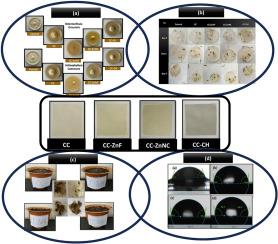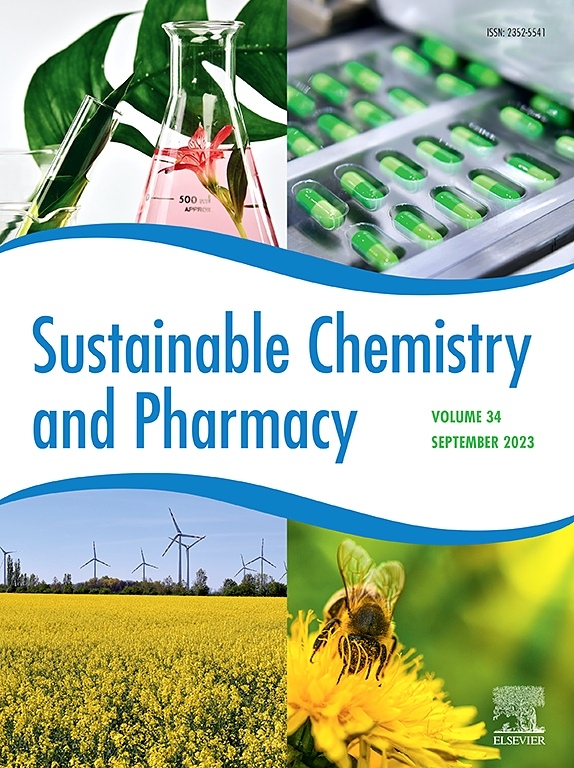Revamping sorghum waste into valuable films: A sustainable bioplastic with tunable properties and agro-suitability
IF 5.8
2区 化学
Q2 CHEMISTRY, MULTIDISCIPLINARY
引用次数: 0
Abstract
The overuse of conventional plastics has raised critical ecological concerns, highlighting the need for sustainable alternatives. In this work, sorghum husk, an agro-waste, was valorized into cellulose–chitosan (CC) based biodegradable films. To enhance their performance, zinc oxide (ZnO) nanoparticles, synthesized from the waste filtrate of cellulose extraction, and charcoal were incorporated as fillers. The resulting biocomposites exhibited improved properties compared to neat CC films. Thermal stability increased markedly, with 20 % weight loss up to 800 °C versus 57 % in control films. Tensile strength improved from 16.4 to 19.9 MPa, while moisture content decreased significantly upon filler addition. Antioxidant activity was notably enhanced, rising from 9.6 % in CC films to 23.2 %, 31.6 %, and 72.9 % in films with ZnO nanofillers, ZnO nanocomposites, and charcoal, respectively. Seed germination tests showed that all the bioplastic films were safe for plants, promoting growth and proving to be non-toxic and highly compatible. These findings collectively underscore the potential of these cellulose-based biocomposite films as sustainable, functional, and eco-friendly alternatives for packaging and agricultural applications.

将高粱废料改造成有价值的薄膜:具有可调特性和农业适用性的可持续生物塑料
传统塑料的过度使用引发了严重的生态问题,凸显了对可持续替代品的需求。以农业废弃物高粱壳为原料,制备了纤维素-壳聚糖(CC)基生物可降解薄膜。为了提高其性能,采用纤维素提取废液滤液合成氧化锌纳米颗粒和活性炭作为填料。与纯CC膜相比,所得生物复合材料表现出更好的性能。热稳定性显著提高,在800°C时,重量下降20%,而对照膜的重量下降57%。添加填料后,拉伸强度由16.4 MPa提高到19.9 MPa,而含水率显著降低。氧化锌纳米填料膜、氧化锌纳米复合材料膜和活性炭膜的抗氧化活性分别从CC膜的9.6%提高到23.2%、31.6%和72.9%。种子萌发试验表明,所有生物塑料薄膜对植物都是安全的,促进了植物的生长,证明了其无毒和高度亲和性。这些发现共同强调了这些纤维素基生物复合膜作为可持续、功能性和环保的包装和农业应用替代品的潜力。
本文章由计算机程序翻译,如有差异,请以英文原文为准。
求助全文
约1分钟内获得全文
求助全文
来源期刊

Sustainable Chemistry and Pharmacy
Environmental Science-Pollution
CiteScore
8.20
自引率
6.70%
发文量
274
审稿时长
37 days
期刊介绍:
Sustainable Chemistry and Pharmacy publishes research that is related to chemistry, pharmacy and sustainability science in a forward oriented manner. It provides a unique forum for the publication of innovative research on the intersection and overlap of chemistry and pharmacy on the one hand and sustainability on the other hand. This includes contributions related to increasing sustainability of chemistry and pharmaceutical science and industries itself as well as their products in relation to the contribution of these to sustainability itself. As an interdisciplinary and transdisciplinary journal it addresses all sustainability related issues along the life cycle of chemical and pharmaceutical products form resource related topics until the end of life of products. This includes not only natural science based approaches and issues but also from humanities, social science and economics as far as they are dealing with sustainability related to chemistry and pharmacy. Sustainable Chemistry and Pharmacy aims at bridging between disciplines as well as developing and developed countries.
 求助内容:
求助内容: 应助结果提醒方式:
应助结果提醒方式:


